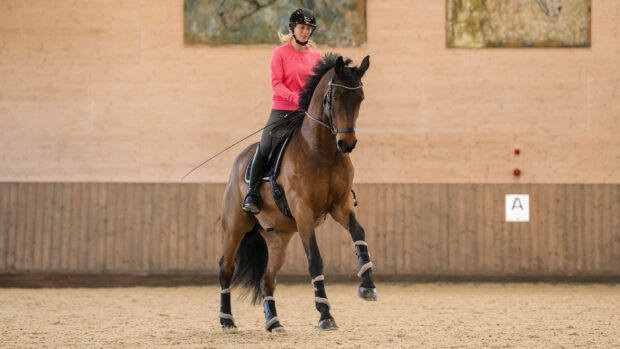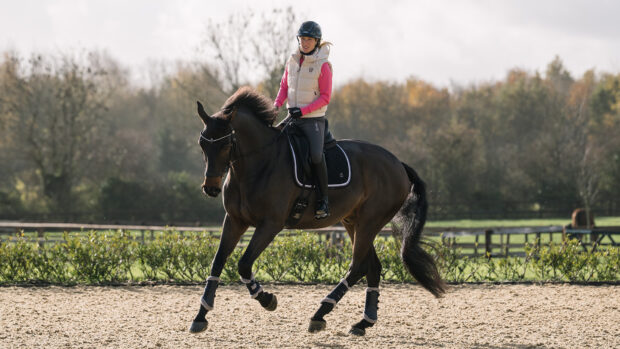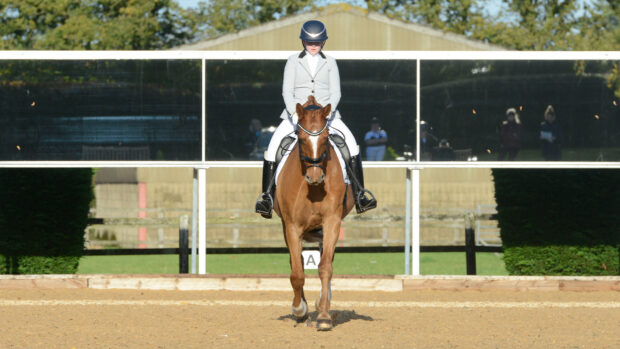Willa Newton (pictured) is a 30-year-old British event rider based in Leicestershire. She represented Britain at three consecutive young rider championships, winning team gold and individual silver in 2011. This season she has notched up two top-10 placings at five-star events, including eighth at Burghley and fifth at Luhmühlen.
Training the stars
My former top-level horse, Newmarket Vasco One, was notorious for getting tight and tense in the dressage but, as he was thoroughbred, I didn’t like overworking him because he’d get sore. I’d get to the event early and settle him by showing him his environment and getting him used to the atmosphere, which would help him in the arena.
Tension in the dressage phase is pretty common with fit event horses, and can appear in many different ways. It can be caused by a variety of things, such as a big atmosphere or windy conditions.
There are many different ways to combat tension in the arena and it’s important to devise a system that works for your horse.
Tackling the issue
1. Firstly, I always consider the warm-up. It is vital to have a clear routine for each horse; I experiment with different things to work out exactly what works for each individual. This can take a while, but it’s worth it as a good warm-up is key to consistency.
2. I like to keep the work at competitions the same as what I am doing at home, so my horses gain confidence and can feel as relaxed as possible.
If I have a horse who gets tight in the back, I do a lot of stretching and long-and-low work to encourage him to relax over his back before I pick him up. I also avoid too much uphill work before the test as this can make horses sore in the back and the tension can then be even worse.
I like exercises that get your horse really listening to your seat and aids. This seems to reduce the tension because they are focusing on you rather than other distractions.
3. Another technique I like to use is to do lots of loose lungeing when I am at the competition as I find this gives my horses a chance to release any pressure and tightness. That way, rather than overdoing the ridden work and risking making him sore and tight, the horse has the opportunity to work on his own balance and is more likely to be relaxed when you get on.
4. If your horse is spooky, spend time on arena familiarisation to work out what he finds particularly spooky. This way, you can prepare — for example, using a bit more inside flexion to distract him from that particular area.
Making the most of the arena familiarisation gives your horse time to relax in the new atmosphere and environment. This will help him return to the arena relaxed and ready to work during the test.
Continued below…
You might also be interested in:

Sarah Bullimore’s figure-of-eight jumping exercise for focus
The five-star eventer shows how the figure-of-eight jumping exercise can help develop balance, rhythm and the ability to land on

Subscribe to Horse & Hound magazine today – and enjoy unlimited website access all year round
Things to consider…
- Always ensure your horse’s tension or spookiness isn’t pain-related and that he is physically in good health and his tack fits.
- Wearing soundproof ear covers can help to muffle noise, which can encourage some horses to settle during the dressage test.
- Only ask your horse to compete at a level for which he’s well prepared — over-facing him can exacerbate any anxiety.
Horse & Hound magazine, out every Thursday, is packed with all the latest news and reports, as well as interviews, specials, nostalgia, vet and training advice. Find how you can enjoy the magazine delivered to your door every week, plus options to upgrade to access our H&H Plus online service which brings you breaking news as it happens as well as other benefits.




